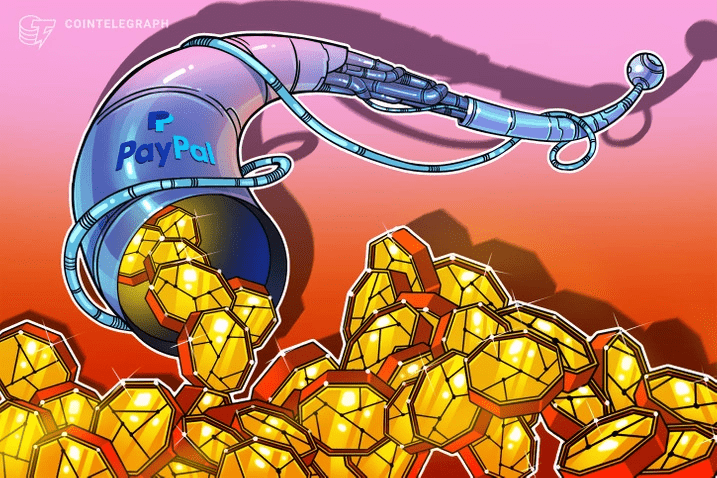Will PayPal’s crypto integration bring crypto to the masses? Experts answer
November 09, 2020 @ 14:29 +03:00
One of the most discussed topics within the crypto community recently has been PayPal’s announcement that its customers will be able to buy and sell cryptocurrencies. The service is expected to be fully rolled out early next year.
The company’s goal “to increase consumer understanding and adoption of cryptocurrency,” as stated in its press release, seems to be a needed step in cryptocurrency popularization. Mainstream awareness of crypto still remains very low. As data from a Statista survey indicates, Bitcoin (BTC) use in countries with developed economies is below 10%, with the lowest levels in Sweden, Denmark and Japan. Meanwhile, some optimistically predict that this number will grow to 90% of the U.S. population by 2030.
PayPal’s president and CEO, Dan Schulman, said that “The shift to digital forms of currencies is inevitable, bringing with it clear advantages in terms of financial inclusion and access; efficiency, speed and resilience of the payments system; and the ability for governments to disburse funds to citizens quickly.” Similarly, the former prime minister of Malta, Joseph Muscat, told the General Assembly of the United Nations in 2018 that cryptocurrencies were the “inevitable future of money.”
PayPal will begin by offering its services for users with Bitcoin, Ether (ETH), Litecoin (LTC) and Bitcoin Cash (BCH), and the company has acquired from the New York State Department of Financial Services what it claims to be a “first-of-its-kind” conditional BitLicense — a license required to operate a digital currency business in New York — and partnered with United States-based stablecoin operator Paxos to enable this service for its customers.
Considering that PayPal had a reported 346 million active users in the second quarter of 2020 — a figure that has since increased in the third quarter to 361 million, according to its latest quarterly report — the decision to offer its customers services related to cryptocurrencies seems to be a significant step toward mainstream adoption. Last year, Cointelegraph asked experts in the crypto and blockchain industries for their opinions on crypto mass adoption. This time, the question was: Could PayPal’s recent announcement of beginning to offer crypto payments possibly force the mass adoption of crypto?
Cristina Dolan, founder and CEO of InsideChains and vice chair of the MIT Enterprise Forum:
“This is a very exciting announcement that will help increase crypto adoption for traditional value transfer or payments by offering an easy and integrated solution for the 346 million active PayPal users. The most challenging part of utilizing crypto for payments is the on-and-off ramp from the crypto blockchain networks using keypairs to make a payment or a transfer. Reducing that friction at the transaction point will make it easier to integrate it into simple value transfer use cases, therefore making it less intimidating. This may even increase the velocity of crypto and Bitcoin spending across the network while increasing its perceived usability and value as a currency, not just a store of value. PayPal dominates payments processing, yet integrating crypto may also attract new customers.”
Dominik Schiener, co-founder of the IOTA Foundation:
“Since there is no change to the merchant end of these transactions, right now the adoption would be on the user end. PayPal adding crypto as an option for users does speak to a future in which both ends of the transaction are engaged in crypto, which is very exciting for our adoption. This will eventually lead to mass adoption as well as a new method of payments between not just users and merchants but smart devices and smart cities. As more payments platforms accept crypto, we will see that awareness grow into increased interconnectivity with IoT technology”.
Jay Hao, CEO of OKEx:
“PayPal’s move into offering cryptocurrency services is extremely bullish for the space; however, it does not in itself signal instant mass adoption of them. What we are seeing, which is a very key sea change, is the normalization of cryptocurrencies like Bitcoin and their legitimization by institutions and large household companies. Paypal will start offering these services to its U.S. customers, but with some 350 million customers around the world, this is a big step toward greater awareness and acceptance. Of course, it does not mean that everyone will rush out and buy Bitcoin, but as it gradually becomes more accepted, particularly against the backdrop of an economic crisis in which fiat currencies are losing their purchasing power, more entrants will naturally come to the market. I think that many payments giants and tech companies like PayPal are also seeing the way that things are going and that they need to join it or get run over by it.
Will PayPal’s crypto integration bring crypto to the masses? Experts answer, CoinTelegraph, Nov 9







